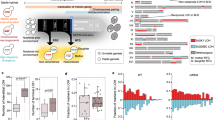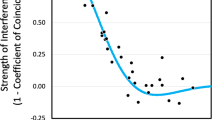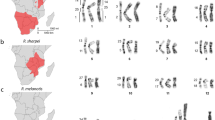Abstract
GENETICALLY recombinant chromosomes can be induced (at a low frequency) in the Drosophila melanogaster male, although crossing-over does not usually occur in the male. The agents which have been shown to induce crossing-over are all mutagens (for example, formaldehyde1–3, diethyl sulphate4, nitrogen mustard5, dihydroxydimethylperoxide6, X-rays7 and γ-rays8). It is therefore difficult in general to exclude the loss of a coupled genetic marker by mutation or by chromosomal deletion over one (or more) of the genetic markers. Usually, the latter event is operationally defined by lethality of the homozygote for the apparently recombinant chromosome, although the simultaneous presence of an independent recessive lethal mutation cannot necessarily be ruled out.
This is a preview of subscription content, access via your institution
Access options
Subscribe to this journal
Receive 51 print issues and online access
$199.00 per year
only $3.90 per issue
Buy this article
- Purchase on Springer Link
- Instant access to full article PDF
Prices may be subject to local taxes which are calculated during checkout
Similar content being viewed by others
References
Sobels, F. H., Z. Vererbungslehre, 87, 743 (1955).
Whittinghill, M., and Lewis, B. M., Genetics, 46, 459 (1961).
Sobels, F. H., Bootsma, D., and Tates, A. D., Drosophila Inform. Serv., 33, 161 (1959).
Pelecanos, M., Nature, 210, 1294 (1966).
Whittinghill, M., Genetics, 33, 634 (1948).
Sobels, F. H., and van Steenis, H., Nature, 179, 29 (1957).
Patterson, J. T., and Suche, M. L., Genetics, 19, 223 (1934).
Whittinghill, M., Genetics, 36, 332 (1951).
Sobels, F. H., Rad. Res. Suppl., 3, 171 (1963).
Alderson, T., Nature, 187, 485 (1960).
Alderson, T., Nature, 185, 904 (1960).
Alderson, T., Nature, 191, 251 (1961).
Alderson, T., Mutation Res., 1, 77 (1964).
Auerbach, C., and Moser, H., Z. Vererbungslehre, 85, 479 (1953).
Sobels, F. H., Drosophila Inform. Serv., 28, 156 (1954).
Sang, J. H., J. Exp. Biol., 33, 45 (1956); Proc. Roy. Soc. Edinburgh, B, 66, 339 (1957).
Auerbach, C., in Mutation, Part I, Methods (Oliver and Boyd, 1962).
Author information
Authors and Affiliations
Rights and permissions
About this article
Cite this article
ALDERSON, T. Induction of Genetically Recombinant Chromosomes in the Absence of Induced Mutation. Nature 215, 1281–1283 (1967). https://doi.org/10.1038/2151281a0
Received:
Issue Date:
DOI: https://doi.org/10.1038/2151281a0
This article is cited by
-
Chemotherapy for an Elective Effect on Mammalian Tumour Cells
Nature New Biology (1973)
Comments
By submitting a comment you agree to abide by our Terms and Community Guidelines. If you find something abusive or that does not comply with our terms or guidelines please flag it as inappropriate.



